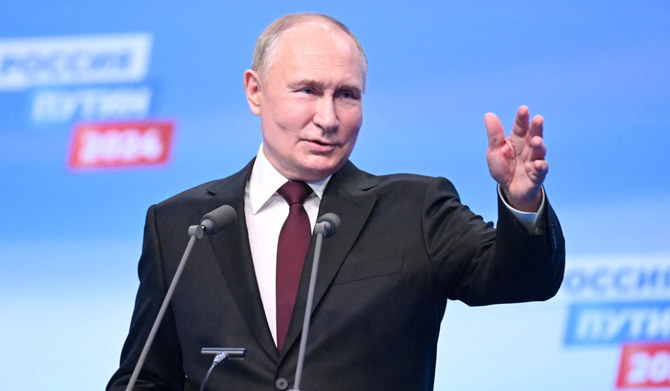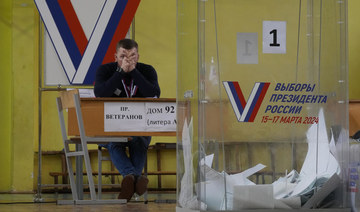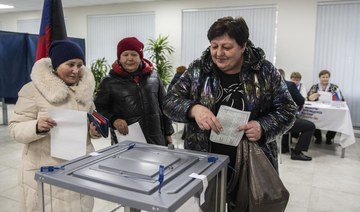MOSCOW: Russians crowded outside polling stations at noon Sunday on the last day of a presidential election, apparently heeding an opposition call to protest against President Vladimir Putin in a vote that offered them no real alternatives after he ruthlessly cracked down on dissent.
Shortly after the last polls closed in Russia, early returns pointed to the conclusion everyone expected: that Putin would extend his nearly quarter-century rule for six more years. According to Russia’s Central Election Commission, he had some 87 percent of the vote with about 60 percent of precincts counted.
The extraordinary early results — which Putin hailed as an indication of “trust” and “hope” in him — were another reflection of the preordained nature of the election. The Russian leader only faced competition from three token rivals and any public criticism of him or his war in Ukraine was stifled.
Putin’s fiercest political foe, Alexei Navalny, died in an Arctic prison last month, and other critics are either in jail or in exile. Unusually, Putin referenced Navalny by name in a news conference after polls closed. And he said he was informed of an idea to release the opposition leader from prison, days before his death. Putin said that he agreed to the idea, on condition that Navalny didn’t return to Russia.
Beyond the fact that voters had virtually no choice, independent monitoring of the election was extremely limited.
As people voted Sunday, Russian authorities said Ukraine launched a massive new wave of attacks on Russia, killing two people.
In a tightly controlled environment with little room for real protest, Navalny’s associates urged those unhappy with Putin or the war to go to the polls at noon on Sunday — and lines outside a number of polling stations both inside Russia and at its embassies around the world appeared to swell at that time.
Among those heeding call was Yulia Navalnaya, Navalny’s widow, who joined a long line at the Russian Embassy in Berlin as some in the crowd applauded and chanted her name.
She spent more than five hours in the line and told reporters after casting her vote that she wrote her late husband’s name on the ballot.
Asked whether she had a message for Putin, Navalnaya replied: “Please stop asking for messages from me or from somebody for Mr. Putin. There could be no negotiations and nothing with Mr. Putin, because he’s a killer, he’s a gangster.”
Some Russians waiting to vote in Moscow and St. Petersburg told The Associated Press that they were taking part in the protest, but it wasn’t possible to confirm whether all of those in line were doing so.
One woman in Moscow, who said her name was Yulia, told the AP that she was voting for the first time.
“Even if my vote doesn’t change anything, my conscience will be clear ... for the future that I want to see for our country,” she said. Like others, she didn’t give her full name because of security concerns.
Another Moscow voter, who also identified himself only by his first name, Vadim, said he hoped for change, but added that “unfortunately, it’s unlikely.”
Meanwhile, supporters of Navalny streamed to his grave in Moscow, some bringing ballots with his name written on them.
Meduza, Russia’s biggest independent news outlet, published photos of ballots it received from their readers, with “killer” inscribed on one, “thief” on another and “The Hague awaits you” on yet another. The last refers to an arrest warrant for Putin from the International Criminal Court that accuses him of personal responsibility for abductions of children from Ukraine.
After polls closed, Putin said the protests had no effect and that any crimes would be punished.
Some people told the AP that they were happy to vote for Putin — unsurprising in a country where independent media have been crippled, state TV airs a drumbeat of praise for the Russian leader and voicing any other opinion is risky.
Dmitry Sergienko, who cast his ballot in Moscow, said, “I am happy with everything and want everything to continue as it is now.”
Voting took place over three days at polling stations across the vast country’s 11 time zones, in illegally annexed regions of Ukraine and online. While polls closed Sunday night in Russia, voting continued at some embassies around the world.
Despite tight controls, several dozen cases of vandalism at polling stations were reported across the voting period.
Several people were arrested, including in Moscow and St. Petersburg, after they tried to start fires or set off explosives at polling stations while others were detained for throwing green antiseptic or ink into ballot boxes.
Dmitry Medvedev, a deputy head of the Russian Security Council chaired by Putin, called for toughening the punishment for those who vandalize polling stations, arguing they should face treason charges.
Stanislav Andreychuk, co-chair of the Golos independent election watchdog, said that pressure on voters from law enforcement had reached unprecedented levels.
Russians, he said in a social media post, were searched when entering polling stations, there were attempts to check filled-out ballots before they were cast, and one report said police demanded a ballot box be opened to remove a ballot.
“It’s the first time in my life that I’ve seen such absurdities,” Andreychuk wrote on the messaging app Telegram, adding that he started monitoring elections in Russia 20 years ago.
The OVD-Info group that monitors political arrests said that 80 people were arrested in 20 cities across Russia on Sunday.
That left little room for people to express their displeasure, but Ivan Zhdanov, the head of Navalny’s Anti-Corruption Foundation, said that the opposition’s call to protest had been successful.
“The action has shown that there’s another Russia, there are people who stand against Putin,” he said.
Beyond Russia, huge lines also formed around noon outside diplomatic missions in London, Berlin, Paris, Milan, Belgrade and other cities with large Russian communities, many of whom left home after Putin’s invasion of Ukraine.
Protesters in Berlin displayed a figure of Putin bathing in a bath of blood with the Ukrainian flag on the side, alongside shredded ballots in ballot boxes.
Russian state television and officials said the lines abroad showed strong turnout. The Russian Embassy in Germany posted a video of the line in Berlin on X, formerly Twitter, with the caption, “together we are strong — Vote for Russia!”
In Tallinn, where hundreds stood in a line snaking around the Estonian capital’s cobbled streets leading to the Russian Embassy, 23-year-old Tatiana said she came to take part in the protest.
“If we have some option to protest I think it’s important to utilize any opportunity,” she said, only giving her first name.
Boris Nadezhdin, a liberal politician who tried to join the race on an anti-war platform but was barred from running by election officials, voiced hope that many Russians cast their ballots against Putin.
“I believe that the Russian people today have a chance to show their real attitude to what is happening by voting not for Putin, but for some other candidates or in some other way, which is exactly what I did,” he said after voting in Dolgoprudny, a town just outside Moscow.




























